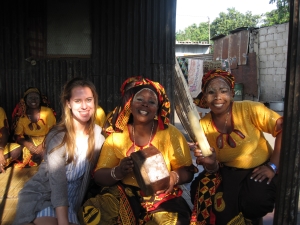LAURA JAGLA
As development professionals, diplomats, and citizens in the U.S. and abroad, what are some efficient communication strategies that we can use for reaching audiences and building understanding among people with values and cultural norms different from our own? Majo Aldana in her TKR October 9th post “Meet me where I’m at” provided excellent food for thought for how to share pertinent health information with people through using communication strategies that meet people “where they’re at” through considering their socioeconomic and cultural backgrounds. Aldana emphasized that it is not enough to communicate with people in their first or native language; it is as important to integrate cultural context in interactions with people to achieve development objectives. As a person who has had to communicate in several foreign languages to reach common understanding, I wanted to share my recent experiences in the challenges of reaching people where they are at across language and cultural barriers.
1. Finding Common Ground
Last year, during a visit to a youth rehabilitation camp in Rwanda, I was reminded that cross-cultural communication requires taking into account cultural cues and context for eliciting open responses and achieving objectives. Our team visited this camp to get a better understanding of the situation of displaced youth in the country (youth who were typically living on the streets for various reasons) and see how these camps were equipping the youth with skills and support to reintegrate them into their communities. When we arrived at the camp, we conversed with the camp’s staff in French, one of Rwanda’s three official languages (French, English, and Kinyarwanda). However, I noticed that one of the staff members at the camp was a bit more reserved. He had once been a displaced youth, and I was curious about his perspective on the camp. So, I decided to change my approach when talking to him. Instead of sticking strictly to business, I switched from French to Kinyarwanda to ask him how his day had been. An instant smile came to his face. “You speak Kinyarwanda,” he said. I explained to him how I picked up a few expressions while visiting a friend’s village and I described my visit there. We then had an excellent conversation on his experience at the camp and the possibilities for youth in Rwanda.
2. Building Trust
In the past months, I had a similar experience in modifying my approach to language and culture to increase understanding and meet new friends at a Mozambican wedding. A friend invited me to partake in her family’s cheugiani celebration; the last part of a traditional Mozambican wedding, which involves traditional Mozambican outfits, dance, song, and presents at the groom’s house. I was the first American to ever visit her family’s house, and her family initially spoke to me in a more distant, formal manner in Portuguese. However, after I sat in the shade of a mango tree cleaning kale leaves with the women for a traditional Mozambique wedding dish and tempted to learn words in Changana (local Bantu dialect), those at the wedding were surprised with my knowledge of Mozambican food and culture. Laughter and stories ensued. Over time, I built trust with the women through sharing in their everyday activities. The women taught me about cultural norms for women in Mozambique, opportunities for youth, and perceptions about health and development.
In Rwanda and Mozambique, through sharing my experiences, incorporating local dialects in my speech, and keeping in mind cultural norms, I have found that people have been more open to sharing their experiences with me. Communicating with people in their first language is not enough for fostering understanding. Through building trust over time and finding common ground, it becomes easier communicate with people in spite of language differences and cultural norms.
